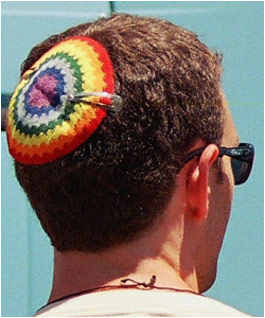 Seeking to live an Orthodox lifestyle can be an isolating proposition. With constant vigilance for dietary restrictions, Sabbath laws, and various other religious standards, one can easily feel separated from mainstream society. Yet, the perceived isolation is even deeper in a small but growing community of Orthodox Jews, a nascent gay Orthodox community.
Seeking to live an Orthodox lifestyle can be an isolating proposition. With constant vigilance for dietary restrictions, Sabbath laws, and various other religious standards, one can easily feel separated from mainstream society. Yet, the perceived isolation is even deeper in a small but growing community of Orthodox Jews, a nascent gay Orthodox community.
In America, gay rights have become an increasingly significant issue in the past decade. As of the most recent election, nine states throughout the U.S. recognize gay civil marriage, including Massachusetts, Connecticut, Iowa, Vermont, New Hampshire, New York, Maine, Maryland and Washington. Moreover, the Obama administration pledged not to support the Defense of Marriage Act (DOMA), a law that affords states the right not to recognize the legal marriages of other states. Ultimately, though, the following question remains: How has Orthodox Judaism responded to the growing community of gay Jews seeking to subscribe to an Orthodox lifestyle?
The 2001 documentary, Trembling Before G-d, introduced the world to a small and underground community within Orthodox Judaism — observant gay and lesbian Jews. As a community, these Jews struggle to navigate troubled waters. They seek to create a lifestyle in which they commit to balancing their Halakhic Judaism (a personal choice) with their natural sexual orientation — yet they encounter heavy opposition.
The ultimate question for a group of people who have devoted their lives to Halakhic Judaism is: What has Halakhic Judaism done for them? Not much, it seems.
The foundation of Orthodox Judaism’s animosity toward homosexuality stems from the longstanding interpretation of a series of verses in Leviticus that prohibit homosexuality: “Thou shalt not lie with mankind, as with womankind: it is abomination” (Leviticus 18:22). Institutions such as Jews Offering New Alternatives for Healing (a nonprofit based out of New Jersey) engage in many of the same practices as Evangelical Christian groups, offering their services of “conversion therapy” — a controversial practice that seeks to transform homosexuals into heterosexuals through extensive rehabilitation. Rabbi Moshe Feinstein, a renowned Orthodox religious leader of the 20th century, also took a harsh stance, calling homosexuality a “desire” that only exists “because it is something prohibited and the yetzer harah (evil inclination) seduces them to rebel against the will of G-d.”
However, the prevailing prohibition of gay rights within Orthodoxy seems to be gradually eroding. Several prominent Orthodox Rabbis have recently expressed a desire to allow homosexual Jews a place in the Orthodox lifestyle, despite an inherently rigid and conservative Halakhic process in which rabbinic authorities interpret Jewish text to confront changing lifestyles. While the evolution of Halakha proves somewhat sluggish, it is open to change provided the law conforms to accepted rabbinic interpretations of Jewish text.
Despite the explicitly stated proscription of homosexual activity expressed throughout the book of Leviticus, it may be argued that there is a place within the Halakha to incorporate a community of gay men and women.
In November of 2011, Rabbi Steve Greenberg, an openly gay rabbi ordained by Orthodox rabbinical seminary of Yeshiva University (REITS), presided over the first marriage between two Orthodox men. Since the event represented the first gay marriage presided over by an Orthodox rabbi, it attracted tremendous controversy. Immediately following the ceremony, 100 Orthodox rabbis signed a letter condemning Rabbi Greenberg’s actions.
Despite the condemnation, Rabbi Greenberg’s move reflects a growing trend in Orthodoxy and a formative step towards accepting gays in the Halakhic community. Trends in Orthodoxy signify a growing willingness to engage the homosexual community in a meaningful way. According to Rabbi Greenberg, perhaps an argument exists that allows for civil gay marriage for Orthodox Jews.
The author of the critically acclaimed book Wrestling with God and Men: Homosexuality in the Jewish Tradition, Rabbi Steve Greenberg renewed an impassioned discussion on homosexuality within Orthodox Judaism. Greenberg’s argument, which has become increasingly popular among many liberal-minded observant Jews, emphasizes an important distinction. First, it is significant to differentiate religious marriage and civil marriage. Halakha fails to recognize civil marriage in any capacity. Thus, while gay marriage may not conform to the definition of religious marriage, which requires a male and female party, it leaves open the possibility of gay civil marriage and practicing Orthodox Judaism.
While the barrage of criticism directed at Rabbi Greenberg reflects a persistent refusal to accept his position, the prospect of a change in direction for Orthodox Judaism seems promising. Wherever one stands on the argument, Jewish history dictates the necessity for tolerance and understanding. As a community, our principle concern should be inclusion rather than exclusion.

